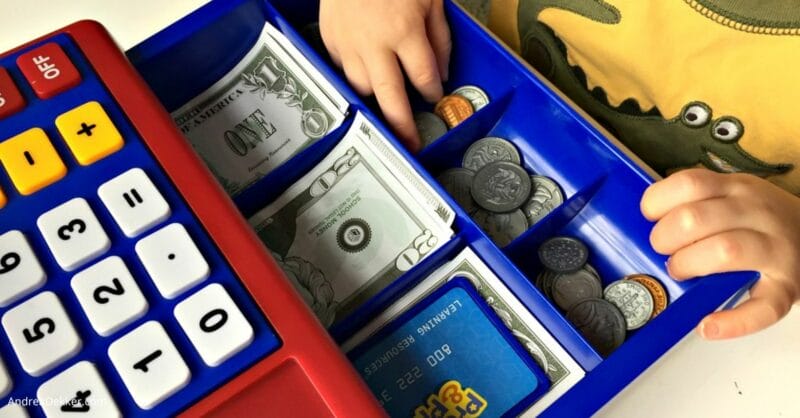
Have you ever wondered how to help younger children think wisely about money management, give generously, and save more?
If so, we’re in the same boat!
Dave and I frequently discuss what might be the ‘best’ way to help our children learn healthy money-management skills and become good stewards of their financial resources (however small they might be in the beginning).
We’ve been doing this for about a decade now, and while we definitely don’t have it all figured out, we DO have a fairly simple system that has helped to grow our young children’s savings accounts, offer multiple income opportunities, provide age-appropriate money-management information, and give them just enough financial freedom.
Interested?
Keep reading!

1. Open a Savings Account with Auto Deposit
It’s never too early to open a savings account for your child (we start at age 4, but you could start earlier too).
It’s fun to open the account around their birthday — you can even plan ahead by giving them money as part of their gift.
Make it a special outing to open the account — get ice cream or do something special together without siblings. They can deposit some or all of their birthday money into their new bank account, and possibly a little extra from Mom and Dad!
(We deposited $44 into their account for their 4th birthday.)
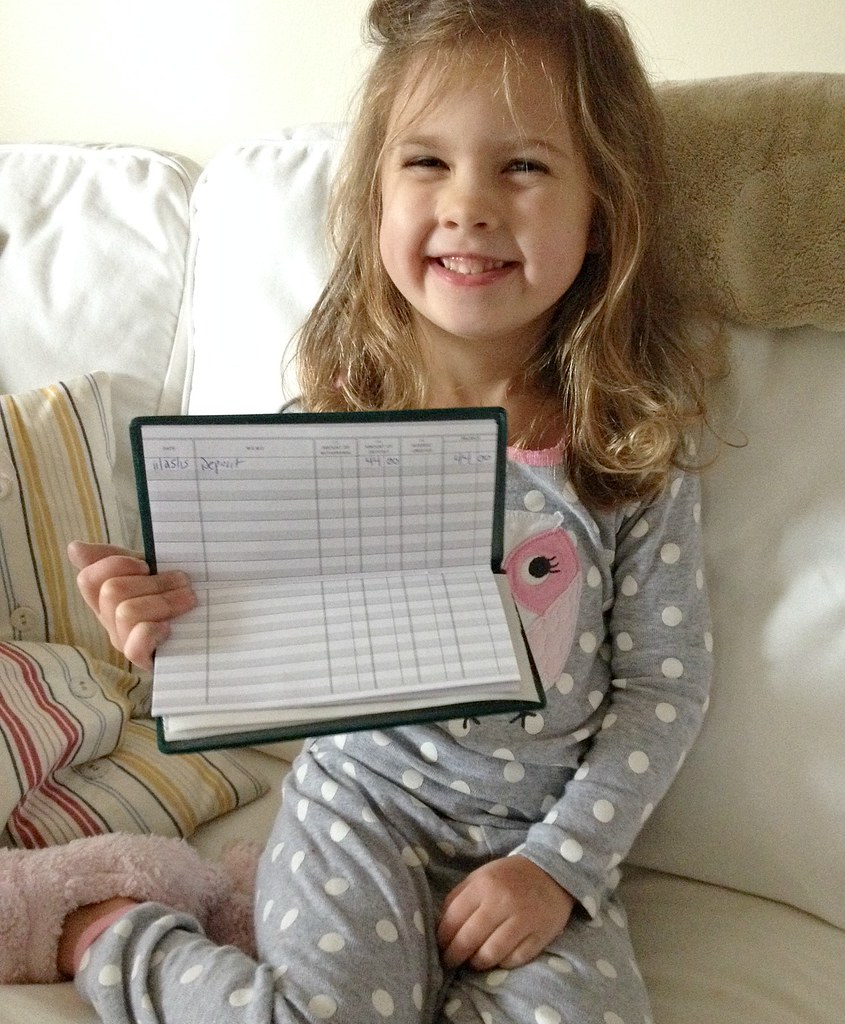
After setting up the savings account, it’s best to create an auto-deposit from your account into their account each month (we correspond this with their age — 10 year old gets $10 per month).
Once this is set up, it requires ZERO effort, time, thought, or energy to help them build up their savings account — at least not until their next birthday when you can choose to increase the deposit by $1 (or not).
Of course, you could structure this however you feel is best for your child, but having some type of savings account in their name is a great starting point when it comes to teaching them about basic saving, spending, and money management.
NOTE: Our children know about the money in their savings account and like when I report on how much it’s growing every year… but they also know this money is not really theirs to spend now. It’s for later — for a car, or college, or a bigger purchase.
2. Provide Income Opportunities
It’s difficult to teach children to manage money if they don’t have any money to manage… so even our younger kids need some form of “income”.
This might be a set allowance, payment for doing specific chores, odd job opportunities, encouraging them to sell un-used toys or games, and even entrepreneurial endeavors.
We do a combination of all of the above:
Monthly Allowance:
We give our children $13 per month… I know that’s a weird number, but let me explain!
We planned to give them $10 per month, with the expectation that they tithed $1 to church. However, there are usually 4 Sundays per month, so we upped the amount to $13, so they could give $4 to church ($1 per week) and still have $9 left to spend or save.
The amount of the allowance really doesn’t matter all that much — it’s more the constancy of the income. Knowing they can count on a certain amount per month allows them to better-determine how much they want to spend on certain things throughout the month.
NOTE: We shop almost exclusively at thrift stores, so their money goes a LONG way. We also don’t make them pay for clothing or shoes when they are young. As they get older and have more of a style preference, they will sometimes need to pitch in for the cost of certain items.
Extra Chores:
From the time they are very young, our children have basic expectations they follow as part of our family… things like:
- taking their shoes off when they come inside
- washing their hands regularly
- putting their dirty clothes in the hamper
- bringing their dishes to the counter after a meal
- emptying their backpacks and lunch boxes when they arrive home from school
- making their beds every morning
- keeping their bedrooms and closets neat and clean
- doing their homework
- practicing their piano
- learning Bible Memory
- picking up after themselves when they get something out
- etc. etc.
In my opinion, these are expectations of living in our home, not necessarily “chores” — and they don’t warrant a payment.
However, as they get a little older (we’re almost into the teen years now) we will pay them extra for extra responsibilities.
For example, Nora does all her own laundry, so we pay her an extra $5 per month. We have also paid her a few bucks to “babysit” Clara when we’ve had events with the boys.
We’ve paid all the kids an extra couple bucks to help with a big yard project or to help us prepare for hosting a big pool party.
And soon enough, the kids will be able to take over all the mowing, weed whipping, and edging… and we will gladly pay them for that too!
Profit from Sales:
I regularly use Facebook Marketplace to buy and sell — and I’ve offered to split the profit 50/50 with the kids when I sell their things.
Or, if it’s something they’ve purchased themselves, they will get the entire profit of the sale.
This is a great incentive to help the kids declutter, and it provides a context of “value”. They realize what we can sell things for, so they are less inclined to buy something similar for a much higher price.
Odd Jobs:
Our children are still quite young, so they don’t have many opportunities for actual jobs yet, but my parents paid Nora to help strip wallpaper, and the boys have gotten a few small odd-jobs from neighbors.
If your kids are creeping into those middle school years, keep an eye and ear open for paid work for younger kids. It doesn’t need to be anything big or official, but there are lots of odd jobs that they could earn $10 or $20 bucks from (which is big money for them!)
Monetary Gifts:
If your child receives money as a gift, encourage them to put at least a small portion of it into savings instead of spending the entire amount.
I realize it might not sound super fun to give money for a child’s birthday gift… but when they are really little (1 and 2) they don’t know what they are opening anyway… and by the time they are 7 or 8, they likely have strong opinions of what they want to buy with their own money (or maybe that’s just my kiddos!)
If you’re a grandparent, aunt or uncle, friend or neighbor who gets invited to a child’s birthday and you don’t know what to give them. Slap a $10 on a box of their favorite candy and call it good.
Chances are the child will appreciate the gift (and so will their parents).
Entreprenurial Endeavors:
Every summer, they ask to have a Lemonade Stand — and every once in a while, we agree to it.
They’ve also made and sold bracelets, magnets, and a few other trinkets — which don’t bring in much, but I love the entrepreneurial spirit behind their efforts and I want to encourage that.
As they’ve gotten older, they’ve come up with bigger ideas, and it’s fun to see their creativity at work — even if it’s not a big income generator.

3. Offer a “Matching” Incentive:
Each of our children have a “bank” in their bedroom (I used Mason jars and these slotted lids).
Any money they get throughout the year goes into their jar — allowance, birthday, Christmas, tooth fairy, Marketplace, odd jobs, etc.
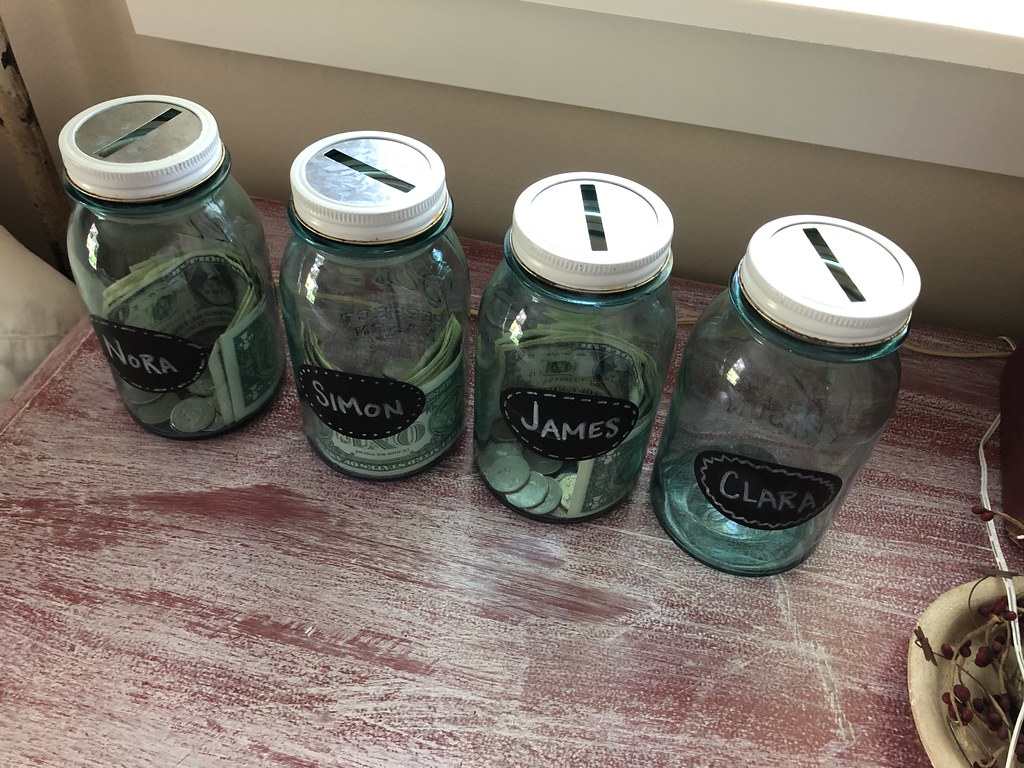
They may spend as much or as little of this money as they want throughout the year (with parental guidance) HOWEVER, we have special savings incentives that has been fairly effective…
Every year, after their birthday, we take the money out of their jar and count it up. We set aside 10% and help them choose an organization or situation to tithe this money to, then they can buy something they wanted (but didn’t get) for their birthday.
The remaining money can either go back into their jar or into their savings account… and Dave and I MATCH whatever they put into savings!
The more money they save throughout the year, the more money will eventually get matched by mom and dad — resulting in significantly more savings on their end!
Our hope is that this incentive helps them to think long-term about their money throughout the year — not just what they want to buy in the moment.
Bonus Tip: Watch your Words
How we as parents speak about saving and spending and the things we buy (or don’t buy) send loud-and-clear messages to our children every day.
- Do we obsess over finding the absolute best deal or do we do a little research to find a good deal and then confidently move forward?
- Do we tip generously for quality service or do we scrimp and save at the expense of others?
- Do we spend frivolously on unnecessary “wants” while going deeper into credit card debt or do we stretch our dollars as far as they can go in an effort to pay off our debt?
- Do we stick to our budget or do we regularly over-spend?
- Do we give generously out of gratitude for our abundance or only what’s absolutely necessary to keep up our “generous” persona?
- Do we talk openly about our finances with our children (in an age appropriate way) or do we treat it as a grownups-only conversation that they are never a part of?
- Do we convey that our jobs and the ability to earn an in income are gifts from God and all our money is His anyway, or do we treat our money as ours and hold onto it too tightly.
- Do we complain about all the things we “can’t afford” or do gratefully acknowledge our many blessings? (Why I don’t say “We can’t afford that.”)
Pay attention to your dialogue around money (with yourself, your friends, your family, etc) as well as your attitude around saving and spending… and consider what messages your children might be taking away from it.
Moving Forward:
As always, what works for our family at this exact moment in time, may not work for your family… it likely won’t work for our family forever either!
We’ve already tweaked our system a bit over the years, and I’m certain we’ll continue to modify it as our children get older and (hopefully) wiser with their money management.

If you’re “behind” me in your parenting journey, I hope this gives you a jumping-off point, and maybe a few new ideas you can implement with your young children to get them excited about saving and managing money.
If you’re ahead of me, I’d love to know how you navigated money management during those middle school and high school years.
And if you’re right there in the middle with me, I think it would be fun to share what’s working for you and your kiddos.
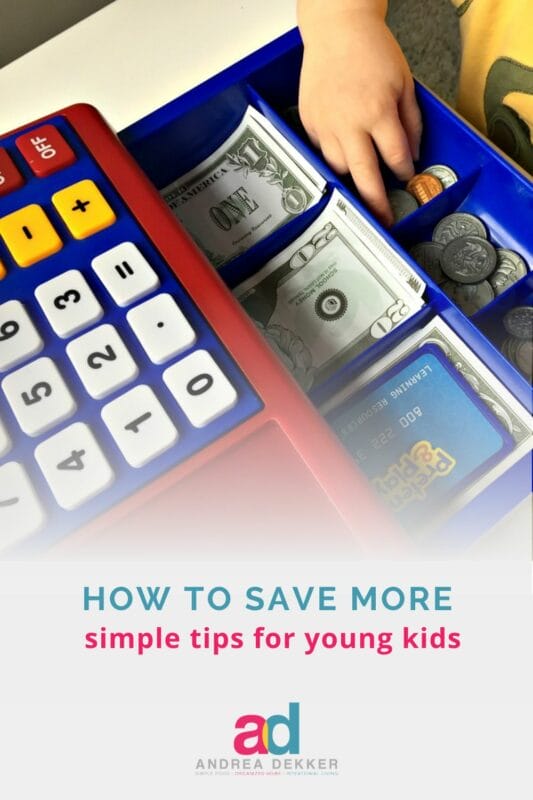

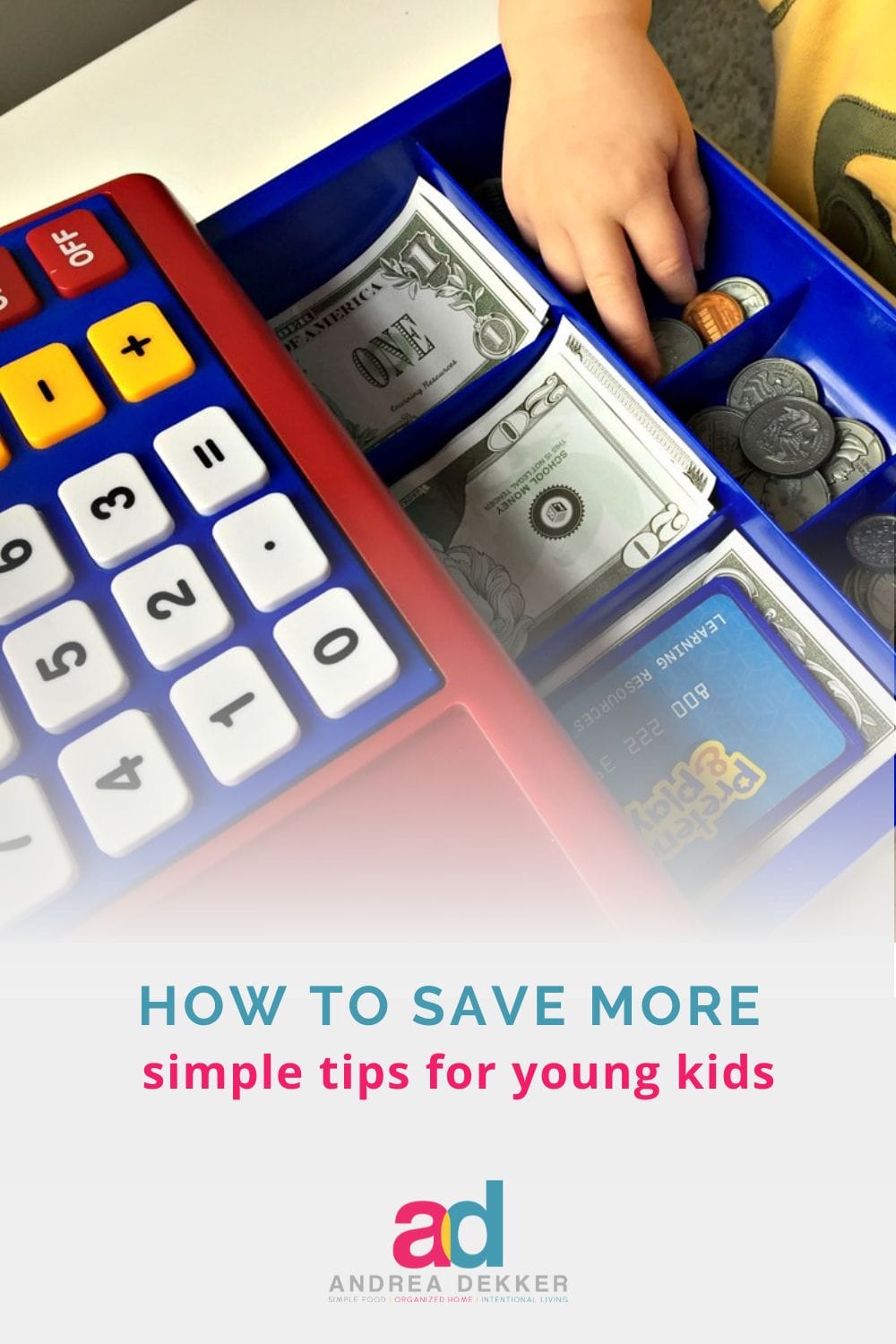
Ashley says
I love this! And I absolutely agree: kids can’t learn to manage money if they don’t have any to practice with. I’ve seen a big trend away from giving allowance and it doesn’t seem to be replaced with anything. We pay our kids on Dad’s payday, requiring them then give a portion and save a portion. It became quickly apparent which of my kids are savers and which are spenders!
I was definitely a spender as a kid but I can distinctly remember a moment (probably around 12) realizing that I had spent my money on a lot of silly things, and thinking how much I could have if I’d have saved it all instead! I’m now absolutely a saver. I’m thankful to my parents for giving me the opportunity to “practice” with money
Andrea says
I love the idea of paying them on your husband’s payday! We always do ours on the 1st of the month and the kids look forward to it 🙂
Melinda says
Hi Andrea,
how old were your kids when you started giving them their weekly dollar?
Our sons are 5 and 3, and very much interested in money and paying in the store.
Andrea says
Hey Melinda,
Our kids were 4 when we started — We open a bank account with them at that age, so it all sort of goes together:)
Amy says
We have done allowances for years. Now that they are older 12 and 14 -This year for back to school shopping they each had a budget for clothing. We went over a few needs before they went shopping to make sure they knew some have to gets, but other than that they could make the decisions. I think it was a good life lesson and a ton easier on me – I didn’t have to say no to anything, if they decided they wanted something I told them how much they would have left after and what was still on there list. They also started paying much more attention when we were at Marshalls/TJ Maxx and a few thrift stores. 🙂
Andrea says
this is a great idea Amy! Thanks for sharing.
I will tuck it away for a few years from now when my kids are a bit older 🙂
Jennifer says
We have a few different things going for our five year old (only child). We do an automatic monthly deposit into a savings account for him that he doesn’t know about yet. We aren’t entirely sure what this money will be used for. Maybe a gift for when he leaves home, maybe as part of a fund to help him buy his first car.
We have a 529 investment that his grandparents contribute to. We put in a lump sum this summer and I think that will be it for our contributions. We will expect him to work to pay for part of his college expenses, but this will most likely cover a large portion.
For cash and money management, we really like Dave Ramsey’s Financial Peace Junior and his book with his daughter, Smart Money, Smart Kids. It’s commission-based which I think is interesting. Our son received the kit for Christmas and he really enjoys it!
Andrea says
cool — I didn’t know there was a financial peace Jr. Thanks for sharing!
Jennifer says
You’re welcome!
Carrie says
I have a related question. How do you handle your children buying gifts for their siblings for birthdays or holidays?
Carrie says
Or gifts for birthday parties or other relatives
Andrea says
they have a little “love bazaar” at school where everything is $5 or less. They buy gifts there each year. Other than that, we really don’t have them buy gifts yet — and Nora is the only one who has ever gone to a friend’s birthday party.
Ann says
We don’t use the word “chores”. We say they are family contributions. And our allowance is not tied to them in any way. As our boy gets older, we require him to pay for more and more things so his allowance also increases. He learns money management and making choices and we would have spent the money either way. Giving him control fills his power bucket! Our only requirement is that when he gets his allowance, he splits it 3 ways (Spend, save, give). He gets to determine how much goes to each one. Sometimes I am surprised. Like when he opted to put the $10 he got for his birthday in “give” because he had enough already. Sometimes I can predict the way he will split it up. Every few months we make a trip to the bank for him to put his save money in there.
Roxanne says
I’m a fan of the book “Prodigal Sons and Material Girls” by Nathan Dungan. It was originally published in the early 2000’s so some of the references are kind of dated, but his approach of “share, save, spend” (in that order) is a good introduction to the different ways money can be used to live out your values!
We’re going to get our 6 year old set up with a bank account later this fall. He’s very excited about it 🙂
Andrea says
ok thanks, Roxanne — I’ll look up that book!
JJ says
These are great ideas–and very doable! We take 30% of financial gifts they receive and put them in their savings. I also wanted to share this. I had never thought to get them something used for their birthday. In my mind, it had to be new to be a “new” gift. But your blog has helped me see that it can be “new to them”. My dad had given my son $100 for his birthday, which meant $30 went into the bank. $70 for a bike would have used ALL the money. I saw a bike on clearance at Walmart and went back to get it. It was $58. Well, it was gone. So I went to a huge consignment sale. A spiderman bike was right in front when I walked down. It was $25!?! So he ended up with a Mickey Mouse hoodie(also from the consignment sale), a Mickey Mouse shirt, a bike, and a couple of other things with all of that extra money. I haven’t always had the best luck with used stuff, so I have always hesitated. And my son has a dog dander allergy, so I have to be careful about things with unreachable places to clean, etc. But this was perfect!!! You inspire me!!!
Andrea says
this is awesome — way to stretch that birthday money!
I honestly don’t think our kids care AT ALL if they are getting used versus new gifts.
I just found Simon the exact pair of UnderArmor high-top shoes he’s been wanting for $15 on Craigslist (normally $60). He’ll be SO excited when he opens them at Christmas this year 🙂
Amy B says
Our to oldest get an allowance/get paid for doing extra chores above and beyond regular household expectations. We pay $.75/year of age, and they have 4-5 chores assigned to them. If they choose not to do chores, they don’t get paid. We try to set it up like a real job, where if you don’t work, you don’t get paid.
We also give sick days
They give some, save about half and have about half to spend. They usually save up for a bigger toy like a Lego set or to have spending money on trips.
A great book we’ve used is “Smart Money Smart Kids” by Rachel Cruze and Dave Ramsey.
I love the idea of auto transfers monthly
Ashley says
Love this book too!
Andrea says
thanks for the book recommendation, Amy!
I’ll add it to my growing library list 🙂
Ann says
Like this book too!!
Rhonda says
You’ve mentioned the auto-savings deposit before – so I started doing that for my 6 and 9 year old kids a while ago. I also have been selling their toys, etc and I like your idea about 50% profit for them.
My parents never gave me an allowance, but back then (in the 80’s) I don’t remember asking for much to buy – maybe because stores/malls were pretty far away, so out of sight, out of mind! I also started working (babysitting) at 11 years old. I was one of the few in our rural neighborhood, and I was busy! I think I had at least a couple grand saved by the time I was 13. I’ve always had a “savings” or “frugal” mentality – I guess it comes a little from my parents, but I think it’s also just my “nature” (vs “nurture”.) I don’t really remember them teaching me about it, other than my mom did help me open a checking account at a young age (early teen) so I could learn to manage it.
Andrea says
yes, the auto-savings is super nice (and SO easy). And the 50% for purged and sold items is a big deal around our house. They are much more willing to purge this way!
Brenda says
My kids are older: 12 & 8. They get an allowance ($10 & $5, respectively). We have decided that going to school and helping at home are their jobs (just like mom & dad have jobs to go to) and they should be paid for maintaining their jobs. Their allowance is weekly, but they they get paid when I get paid (every 2 weeks). They are responsible for paying for their own little school things: popcorn/cupcake Fridays, pencil vending machine, dance fees (for the older one) and any un-necessary desired items, and any extra lunch money they want to spend over what I give them. This helps them realize they have to earn their money (theoretically, if they don’t’ do well in school, they may lose some allowance, but it hasn’t needed to happen yet) and save for what they want to get.
It has actually worked. A few times they really wanted a candy bar from the gas station, but when I asked if they wanted to spend their own money on it they changed their mind. And the younger one bought 6 iced tea drinks one time (approximately $10) and then regretted his choice a few days later when his teas AND his money were gone.
It has also helped them understand why I make some of the decisions I make. For example, we only get waters when we go out to eat because pop for 6 people adds up fast. I asked them if they wanted to pay $15 of their money so we could all have a glass of pop. They decided that water was fine, haha.
Rhonda says
I think that’s fantastic. Better to “fail” at a young age buying the $10 worth of iced tea. I bet the 8 year old will remember that for years to come!
Andrea says
exactly!
Andrea says
ah — don’t you love it when something you put in place actually works 🙂
Sounds like you have a great system going for your family. Thanks for sharing how it works!
Ann says
Nice touch of paying for all to get pop! I wouldn’t have thought of that and they would have gladly spent $3 for a pop for just them!